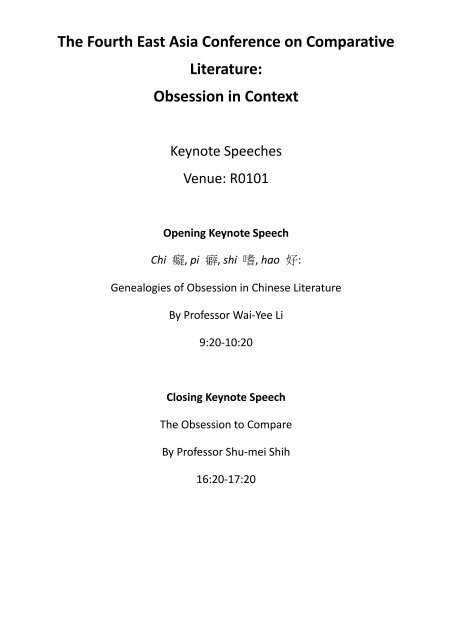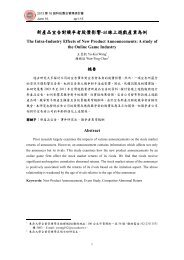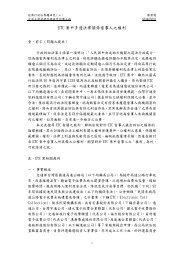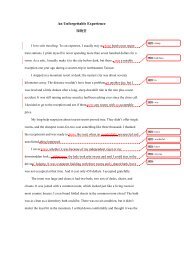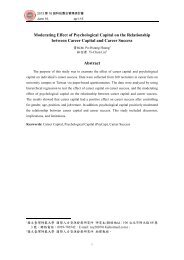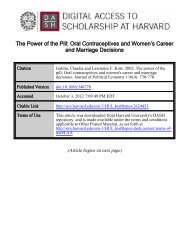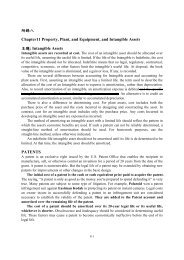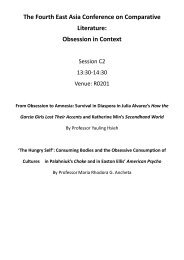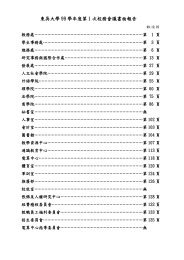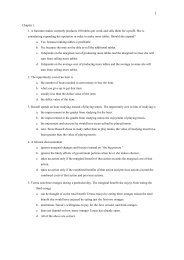Opening Keynote Speech
Opening Keynote Speech
Opening Keynote Speech
Create successful ePaper yourself
Turn your PDF publications into a flip-book with our unique Google optimized e-Paper software.
The Fourth East Asia Conference on Comparative<br />
Literature:<br />
Obsession in Context<br />
<strong>Keynote</strong> <strong>Speech</strong>es<br />
Venue: R0101<br />
<strong>Opening</strong> <strong>Keynote</strong> <strong>Speech</strong><br />
Chi 癡 , pi 癖 , shi 嗜 , hao 好 :<br />
Genealogies of Obsession in Chinese Literature<br />
By Professor Wai‐Yee Li<br />
9:20‐10:20<br />
Closing <strong>Keynote</strong> <strong>Speech</strong><br />
The Obsession to Compare<br />
By Professor Shu‐mei Shih<br />
16:20‐17:20
<br />
Chi , pi , shi , hao : <br />
Genealogies of Obsession in Chinese Literature <br />
<br />
Wai‐yee Li <br />
The word “obsession” in English is derived from “obsidere,” to besiege, in <br />
Latin. The battle metaphor persists from demonology to psychiatry. An obsessed <br />
person is not totally mad—he recognizes his preoccupation with the idée fixe as <br />
divergence from consensual norms, although he may insist on celebrating this as <br />
salutary. A person may succumb to obsession as delusion while claiming to forge a <br />
modus vivendi providing escape, order, and coherence. We have here battles <br />
between mastery and subordination, self and society, the obsessing self and the <br />
observing self. Do such associations help us conceptualize the valence and <br />
meanings of words such as chi and pi in Chinese? What would parallel histories <br />
based on etymology and changing cultural contexts yield? In the history of Chinese <br />
literature, chi and pi are linked to aesthetic‐romantic values and the transformative <br />
powers of the imagination. Such implications are especially evident in the Six <br />
Dynasties and the period from late Ming to early Qing, and they have significant <br />
reverberations in the eighteenth century masterpiece The Story of the Stone <br />
(Honglou meng). <br />
Please DO NOT quote without the<br />
I will not venture into clinical definitions of obsession and will instead draw <br />
from discussions of obsession as a social and cultural category. Historians and <br />
literary scholars typically use the term “obsession” in rather loose ways to <br />
author's permission.<br />
encompass intense interest, fixation, preoccupation, in order to comment on a broad <br />
range of cultural phenomena, even as they boldly demarcate defining moments in <br />
the history of the idea. Lennard Davis, for example, sees a turning point in writings <br />
from mid‐eighteenth century England and France: “Before that divide, some people <br />
were seen either as eccentrics, or in a more religious mode as ‘possessed.’ After that <br />
time, the age of obsession begins as a secular, medical phenomenon.” 1 Marina van <br />
Zuylen also takes the historical roots of the psychiatric concept of monomania, <br />
disseminated by Esquirol and Etienne‐Jean Georget in the first two decades of the <br />
nineteenth century, as the point of departure for surveying the nineteenth century <br />
literary imagination. 2 Such identification of historical beginnings in the eighteenth <br />
and nineteenth century sometimes merges with bigger claims concerning the <br />
symbiosis of modernity and obsession. Davis, for example, traces the confluence of <br />
medical, cultural, and historical discourse and avers that obsession shares common <br />
grounds of focus and repetition with other types of intellectual endeavor (including <br />
psychoanalysis). When the discussion shifts to cultural creation, one often <br />
encounters the implicit claim that self‐division and potential agency underline <br />
obsession. Pathological accounts of obsession presents the patient as victim to <br />
<br />
1 Lennard J. Davis, Obsession: A History (Chicago: The University of Chicago Press, 2008), p. 6. <br />
2 Marina van Zuylen, Monomania (Ithaca: Cornell University Press, 2005), p. 3. <br />
1
urges he cannot control, doomed to relentless repetition because of insatiable desire <br />
for a person, a thing, or an activity. Literary representations, however, often <br />
emphasizes self‐reflexive awareness (attributed to the character, or displaced to the <br />
narrator or the implied author)—the fact the fixation does not derange his <br />
otherwise sound mind. This entails minute distinctions and compartmentalization <br />
of the mind, sometimes presented as the hallmark of modernity. The obsessing self <br />
tries to banish the flux and uncertainties of existence in order to forge its own logic <br />
or system; the observing self veers between validating this as “higher order” and <br />
recognizing it as derangement. <br />
When we turn to the Chinese tradition, the question is not homology (i.e., <br />
whether comparable discourses on the mind exist as explanatory context) but what <br />
will analogous inquiry into etymologies and shifting historical contexts yield. The <br />
Chinese words commonly used to translate “obsession” are chi , pi , shi , hao <br />
. Of these shi and hao, indicating inclination and fondness, appear quite <br />
frequently in early (pre‐Qin to Han) texts. Mostly the context is either negative or <br />
regulative. The term shiyu often suggests rampant desire that undermines <br />
ritual propriety. In Zuozhuan (ca. 4 th century BC), for example, one ruler’s obsession <br />
with cranes leads to disaster: <br />
In winter, in the twelfth month, the Di attacked Wei. Lord Yi of Wei was fond <br />
of cranes, and there were cranes that rode in carriages. When they were <br />
about to do battle (with the Di), those from among the inhabitants of the <br />
capital who had been issued armor said, “Send the cranes! If it is the cranes <br />
who hold salary and rank, then how can the likes of us go to fight?”<br />
author's permission.<br />
3 <br />
(Zuozhuan Min 2.5) <br />
<br />
Please DO NOT quote without the<br />
Wei predictably suffers a crushing defeat. Personal preference, no matter how <br />
apparently harmless, should be subordinate to ritual prescriptions. We are told in <br />
The Discourses of the States (Guoyu, ca. 3 rd cent. B.C.), for example, that the Chu <br />
minister Qu Dao is partial to caltrops, and his deathbed injunction to the elders of <br />
his clan is to have caltrops as sacrificial offerings for him after his death. The elders <br />
are about to comply when his son, Qu Jian, asks to have the caltrops removed. He <br />
argues that Qu Dao, as chief minister of Chu, is identified with Chu laws and rules <br />
that exist both in people’s hearts and in court archives, and such precepts define ties <br />
both to the past and the future. He argues that his father “would not use his private <br />
desires to interfere with the tenets of the domain” . (Guoyu, <br />
“Chu yu” 1.3). 4 (According to proper ritual, a ruler should have as sacrificial offering <br />
an ox; a minister, a sheep; a commoner, a fish.) Teachings that focus on self‐<br />
<br />
3 Wang Zhong , a Qing scholar, notes that giving the cranes a place inside the imperial carriage <br />
was equivalent to granting them the rank and salary of the marshal (see Yang Bojun Chunqiu <br />
Zuozhuan zhu [Beijing: Zhonghua, 1990], p. 265). Versions of this anecdote appears in various <br />
Warring States and Han texts. <br />
4 Xu Yuangao, Guoyu jijie (Beijing: Zhonghua, 2002), p. 488. <br />
2
cultivation typically warn against excessive passions as the source of disequilibrium. <br />
Thus Zhuangzi defines the ideal state of being “without feelings” as “not letting <br />
inclinations and aversions injure one inside”. Early literary <br />
thought, notably exegetical traditions developing around the Classic of Odes, <br />
typically uphold the regulation of emotions and modulation of excesses. Yet <br />
obsession seems to have a potentially redemptive twist—perhaps because the <br />
mental focus and intensity behind it can be theoretically transferred to ethical <br />
norms or spiritual discipline. Confucius may complain about the dearth of people <br />
who “love virtue” , in comparison with the hordes that “love sensual beauty” <br />
, but the comparable mental act of focus also promises a kind of continuity. <br />
Numerous “knack stories” in Zhuangzi recount how obsession with a skill leads to <br />
mastery that approximates the Way, such as the hunch‐backed cicada catcher who <br />
“is undivided in his intent, and thus concentrate his spirit” <br />
(Zhuangzi, “Dasheng”). <br />
Whereas shi and hao signify desire without implying pathology—since <br />
negative implications arise from improper objects of desire rather than inheres in <br />
the act of desiring—chi and pi, words of later provenance, have the “sickness” <br />
(chuang ) radical. The Han lexicographer Xu Shen (d. ca. 120) defines chi as <br />
“mental deficiency” . When the word starts to appear in late Warring States and <br />
Han texts (e.g., Han Feizi, Huainan zi, Han shu, Lunheng), its semantic range includes <br />
lunacy, idiocy, folly, and confusion (in compounds such as kuangchi yuchi , <br />
chiwan ). In Buddhist writings, the word chi is almost always associated with <br />
delusion and ignorance. By the Six Dynasties, however, the word commands a new <br />
author's permission.<br />
range of associations, including idiosyncrasy, deep feelings, aesthetic sensibility, the <br />
gulf between self and society. A pivotal text in this transformation is A New Account <br />
of Tales of the World (Shishuo xinyu) compiled by Liu Yiqing (403‐444). Several <br />
anecdotes in the text (8.17, 8.62, 19.15, 23.41, 24.10) relate how a person of talent, <br />
refinement, or perspicacity is misunderstood and labeled chi, which comes to imply <br />
“hidden virtue” (yinde ) or the quality of being hard to fathom (nance ) <br />
rather than simple folly or deficiency. Chi is also one’s conviction of one’s genius, <br />
irrespective of the disparagement of the world. Anecdotes about the artist Gu Kaizhi <br />
(ca. 344‐406) are illuminating in this regard. <br />
Please DO NOT quote without the<br />
Someone asked Gu Kaizhi: “How does your ‘Poetic Exposition on the Zither’ <br />
compare to Ji Kang’s ‘Poetic Exposition on the Horizontal Lute’?” Gu said, <br />
“The unappreciative ones dismiss it as a later reworking, yet the deeply <br />
discerning ones prize it for its lofty wonder.” <br />
(SSXY <br />
4.98) <br />
Gu expects most to deem his piece inferior to that of his famous predecessor Ji Kang <br />
(223‐262), but also maintains that his unique voice will appeal to the discerning few. <br />
In his annotations to this entry, Liu Jun (462‐521) supplies several sources to <br />
augment this image of the misunderstood genius, further linking chi to aesthetic <br />
3
vision and a kind of monomania. Thus The Book of Restoration (Zhongxing shu, 5 th <br />
cent.): “Gu Kaizhi had broad learning and talent. By temperament slow, he yet had <br />
great self‐regard. At the time people laughed at him.” <br />
爲 The Treatise on Letters (Wenzhang zhi) sponsored by Emperor <br />
Ming of Song (r. 465‐472) quotes Huan Wen’s judgment that Gu combines “folly and <br />
cleverness by halves” and notes: “People say that Gu has ‘three supreme talents’: <br />
supreme painting, supreme writing, supreme folly.” <br />
Sequel to Jin History (Xu Jin yangqiu, 5 th cent.) supplies another anecdote: <br />
“When he was cavalier attendant, his office was next to that of Xie Zhan. He once <br />
intoned drawn‐out rhymes under the moon, confident of being akin to the worthy <br />
ancients. Xie Zhan applauded him from afar, and Gu, being thus encouraged, applied <br />
himself even more and forgot fatigue. Xie was about to fall asleep, and asked the <br />
man massaging his legs to take his place. Gu did not notice the difference, and thus <br />
persisted until it was almost dawn.” 爲 <br />
<br />
<br />
In the last anecdote, Gu is the victim of a joke, but he may also claim the glory <br />
of absorption in his poetic creation. In an analogous story from Sequel to Jin History, <br />
Gu’s gullibility can also be regarded as a way to mythologize his art: “Gu Kaizhi was <br />
Please<br />
especially fond of painting, and his art was peerless in his era. He once sent a <br />
DO NOT quote without the<br />
cabinet of his paintings to Huan Xuan. They were all his finest and he deeply <br />
treasured them. He sealed and inscribed the opening panel of the cabinet. Huan <br />
then opened it from the back, took out the paintings, and repaired it carefully. When <br />
author's permission.<br />
Gu saw that the seal and the inscription were intact but the paintings were gone, he <br />
simply said, ‘These wonderful paintings attained spirituality and were gone upon <br />
transformation, just in the way humans ascend as immortals.’” <br />
厨 厨 <br />
<br />
(cited by Liu Jun in SSXY 21.7). Other stories about Gu’s “spiritualization” of his <br />
paintings and his belief in their magical potency point to the same logic. <br />
Total absorption in one’s artistic powers is a kind of obsession. It is no <br />
accident that the Six Dynasties, often said to mark the rise of aesthetic selfconsciousness and heightened awareness of different mental and emotive faculties, <br />
should also see the rise of anecdotes about obsessions. The word pi, first used in Ge <br />
Hong’s (284‐364) Baopu zi to refer to the accumulation of phlegm because of <br />
excessive drinking (j. 13.223), comes to mean obsession by the fourth century: 5 <br />
Wang Ji excelled in understanding horses. He once rode a horse decked out <br />
with patterned leg‐shields. With a river in front, the horse refused to cross it <br />
<br />
5 Judith Zeitlin discusses the idea of pi, with a focus on sixteenth and seventeenth century examples. <br />
See Zeitlin, “The Petrified Heart: Obsession in Chinese Literature, Art, and Medicine,” in Late Imperial <br />
China, vol. 12, no. 1 (June 1991), pp. 1‐26. <br />
4
for the longest time. Wang said, “This must be because it cherishes the <br />
shields.” He had someone remove them, and they crossed right away. <br />
<br />
(SSXY 20.4) <br />
Wang Ji’s love for the horse transcends the connoisseur’s judgment—he humanizes <br />
it as it becomes the object of empathy and communion. As elucidation Liu Jun cites <br />
The Forest of Words (Yulin, 4 th cent.): “Wang Ji by nature loved horses and was also <br />
very discerning when it came to their distinctions. That was why Du Yu (222‐284) <br />
said that Wang Ji was obsessed with horses and He Qiao was obsessed with money. <br />
Emperor Wu (Sima Yan) asked Du Yu: ‘And what is your obsession, sir?’ Du replied, <br />
‘Your servant is obsessed with Zuozhuan.’” <br />
<br />
By characterizing Wang Ji’s fellow feelings with horses as “obsession,” Du Yu implies <br />
excess and impropriety. By using the same word pi to juxtapose different fixations, <br />
he also seems to suggest that intensity of mental focus forges a common ground. <br />
Du Yu is deliberately reticent on the relative merits of the three obsessions <br />
he names, although the object of his (a canonical classic) would normally place him <br />
higher. But sometimes the manner or style of obsession, even more than its object, <br />
becomes the criteria of judgment. Thus Zu Yue’s obsession with money and Ruan <br />
Fu’s with wooden clogs both require laborious attention: “both were likewise <br />
burdensome, and there was not yet judgment of what was better or worse”<br />
. (SSXY 6.15) It is only when Zu is caught counting money and <br />
author's permission.<br />
trying to hide it from a visitor, while Ruan blows the fire and waxes his clogs in <br />
composure even with a visitor present that the latter is judged to be superior. Ruan <br />
muses aloud, “I wonder how many pairs of clogs I would go through in a lifetime?” <br />
(SSXY 6.15). Self‐sufficient and oblivious in his obsession, <br />
Ruan also links it to a sense of philosophical rumination and detachment. <br />
Please DO NOT quote without the<br />
The evaluation of obsessions reminds us of its social function: it is a way to <br />
establish individuality, claim superior sensibility, and define an oppositional stance <br />
vis‐à‐vis the powers that be. A famous anecdote describes the encounter between <br />
the famous poet Ji Kang as he immerses himself in “forging iron” and the aristocratic <br />
Zhong Hui (225‐264) along with his distinguished retinue. “Ji Kang hammered away <br />
without stopping as if there were no one around him. Moments passed and they did <br />
not exchange any word. Zhong Hui rose to leave, and Ji Kang said, ‘What have you <br />
heard with your coming? What have you seen upon leaving?’ Zhong Hui replied, ‘By <br />
coming, I have heard what I heard. Upon leaving, I have seen what I saw’” <br />
<br />
(SSXY 24.3). The exchange points to the <br />
competition between the “performer” of obsession and its “perceiver.” Ji Kang, <br />
defiantly absorbed in his fixation, challenges Zhong Hui to respond to his refusal to <br />
communicate. Zhong has enough wit to bolster his dignity with an evasive and <br />
noncommittal reply. Ji and Zhong, identified respectively with “Daoist naturalness” <br />
5
and “moral teachings,” also belonged to opposing political factions. Zhong Hui <br />
eventually stoked the calumny that brought about Ji Kang’s downfall. <br />
The term “being obsessed with emotions” or “having obsessive feelings” <br />
(qingchi) also first appears in the Six Dynasties. When the term is used in A New <br />
Account of Tales of the World, however, it does not refer to “eroto‐mania” but instead <br />
describes a heightened sensibility prone to confusion. Thus Ren Zhan, famous for <br />
his beauty and refinement, seems to have been traumatized when the Jin court <br />
moved south in 312. He “lost his will” , became disoriented and excessively <br />
emotional, and is described with implicit disparagement as having “obsessive <br />
feelings” (SSXY 34.4). Another Jin aristocrat, Wang Xin (d. ca. 397), climbs <br />
Mount Mao and loudly laments that he would certainly “die from his feelings” <br />
(SSXY 23.54). There could be genuine disquiet or implicit pride in that <br />
declaration. Poetic expositions (fu) about seductive yet ultimately unattainable <br />
goddesses inspiring obsessive longing flourished in the Six Dynasties. The fact that <br />
these works usually end with loss and the mortal lover’s struggle to regain <br />
equilibrium indicates fundamental anxieties about excessive emotions. In the <br />
human realm, a man showing obsessive devotion to a woman makes him an object <br />
of scorn, such as the luckless Xun Can (ca. 212‐240) who chills himself in order to <br />
cool off his feverish wife by pressing his body against hers (SSXY 35.2). He is placed <br />
in the category of “Misguided Indulgence” (huoni) in A New Account of the Tales of <br />
the World. <br />
Please DO NOT quote without the<br />
Romantic obsession became part of a more general discourse celebrating <br />
subjectivity, eccentricity, fixation only in the sixteenth and seventeenth century. Of <br />
author's permission.<br />
course there were many references to obsession in the intervening centuries, and a <br />
rich literature on collecting and connoisseurship, especially vibrant during the Song <br />
dynasty, adds to the aesthetics of obsession. Yet there is also a kind of poetic justice <br />
in the leap: the affinities between the Six Dynasties and the late Ming are evinced by <br />
the popularity and imitations of A New Account of the Tales of the World in the latter <br />
period. Miscellanies and collections of earlier and contemporary anecdotes about <br />
obsession flourished, notably the chapter, “Fixations and Passions” (pishi ), in <br />
Feng Menglong’s (1574‐1646) Past and Present Aids to Conversation (Gujin tangai <br />
) and Hua Shu’s Short History of Fixations and Eccentricities (Pidian xiaoshi <br />
). <br />
The state of being obsessed is upheld as aspiration of universal application in <br />
late Ming writings. Thus Tang Binyin (b. 1568): “A person cannot be without <br />
obsessions” , and Yuan Hongdao (1568‐1610): “A person cannot be <br />
without follies”. Wu Congxian (mid 17 th cent.), quoting Tang and Yuan, <br />
concludes: “Thus there is no need to be rid of follies or to be cured of obsessions”<br />
. 6 The importance of obsession is sometimes presented <br />
as “aesthetic necessity.” Zhang Chao opines in Dark Dream Shadows (Youmeng ying): <br />
<br />
6 Wu Congxian, Xiaochuang ziji, p. 151, no. 171. <br />
6
“Flowers cannot do without butterflies, mountains cannot do without streams, rocks <br />
cannot do without moss, water cannot do without aquatic plants, evergreen trees <br />
cannot do without vines, a person cannot do without obsessions”<br />
. <br />
Obsession is no longer something one succumbs to; rather it almost becomes an <br />
adornment. The person immersed in his fixation self‐consciously becomes an <br />
aesthetic spectacle—this is especially true of conventionalized accounts of <br />
obsessions with “refined things” (such as flowers, poetry, or art). <br />
Zhang Dai (1597‐1679) declares: “One cannot befriend a person without <br />
obsessions, for he would lack deep feelings; one cannot befriend a person without <br />
flaws, for he would lack the spirit of genuineness”<br />
. 7 Obsessions, like flaws, confirm a person’s <br />
genuine emotions and individual spirit because individuation is conceived of as <br />
sickness, the perversion or diminution of cold perfection. Yuan Hongdao maintains <br />
that he is most drawn to the flaws in his younger brother Yuan Zhongdao’s (1570‐<br />
1623) writings, because “even the flawed parts are full of his distinctive, original <br />
words” . 8 <br />
If obsession is not universalized as human condition, it is because only those <br />
with superior sensibility suffer that burden. Yuan Hongdao explains: “The way Ji <br />
Kang was with forging iron, Wang Ji with horses, Lu Yu with tea, Mi Fu (the Mad Mi) <br />
with rocks, or Ni Zan with cleanliness—in all these cases they were using their <br />
obsessions to lodge their uncompromising, distinct, soaring spirit. From what I have <br />
author's permission.<br />
seen, the ones whose words are insipid and whose countenances are unappealing <br />
are all people without obsessions. If one is truly obsessed with something, then one <br />
would immerse and indulge in it, one would put life and soul into it, how could one <br />
have time to spare for things such as money, servants, officialdom, or trade?” <br />
<br />
<br />
9 We already mentioned <br />
Ji Kang and Wang Ji earlier. Lu Yu (733‐804) is famous for his Classic of Tea (Cha <br />
jing). The great painter and calligrapher Mi Fu (1051‐1107) was obsessed with <br />
strangely shaped rocks; so much so that he would don official robes and bow to an <br />
interesting rock, calling it “older brother.” Another great artist, Ni Zan (1301‐1374), <br />
features in a number of anecdotes detailing his obsessive fear of contamination. <br />
Yuan Hongdao is thus linking obsession to a range of attributes, including political <br />
defiance (Ji Kang), empathetic understanding (Wang Ji), connoisseurly knowledge <br />
(Lu Yu), and artistic powers (Mi Fu and Ni Zan). Their common denominator is the <br />
Please DO NOT quote without the<br />
<br />
7 Zhang Dai mentions this in the biographies of five eccentrics in his family (“Wu yiren zhuan”) and <br />
also in his account of Qi Zhixiang’s homosexual passion in Dream Memories of Tao’an (Tao’an <br />
mengyi).<br />
8 Yuan Hongdao, “Preface to Xiaoxiu’s Poetry”.<br />
9 Yuan Hongdao, The History of Vase (pingshi 甁 ), “Connoisseurship” (haoshi ). <br />
7
idea of a self inventing its own order that displaces the vulgar concerns shared by <br />
the common run of humanity. Single‐minded focus on an external object seems to <br />
purge the self of contingencies, yet this is ultimately about the vagaries of the self. <br />
In a marginal comment on an entry about Mi Fu’s love of rocks in Feng Menglong’s <br />
Aid to Conversation, Yuan Hongdao opines: “Chrysanthemums for Tao Yuanming, <br />
plum blossoms for Lin Pu, rocks for Mi Fu are not about loving chrysanthemums, <br />
plum blossoms, or rocks—in all these cases it is the self loving the self” <br />
. 10 <br />
The emphasis on individuality notwithstanding, we often find <br />
conventionalized obsessions in late Ming writings—that is, obsession with the <br />
ornaments of literati culture (e.g., flowers, books, poetry, painting). To be thus <br />
obsessed is also to claim membership in elite culture. Yuan Hongdao uses the word <br />
ji (lodge) to describe the ways whereby restless discontent and proud defiance <br />
seek solace and recompense in obsessions. The word ji suggests a temporary abode, <br />
a choice to come and go as one pleases—quite the contrary of the idea of a person <br />
succumbing to obsessions. In other words, with ji the obsessing self regains a <br />
measure of control. Indeed, the imagination of ultimate control and the fear of real <br />
disequilibrium underline the discourse on passions, extreme emotions, and <br />
obsessions during the late Ming. In Yuan Hongdao’s affirmation of obsession cited <br />
above, for instance, the context is “obsession with flowers” (huapi ) of which he <br />
absolves himself. Those with a true passion for flowers brave dangers and <br />
hardships to acquire rare specimens, observe every phase of flowering with <br />
intensity, and gain vast and intuitive knowledge about flowers. Yuan considers <br />
author's permission.<br />
these “true connoisseurs”(zhen haoshi ) whom he cannot emulate: “As for the <br />
way I keep flowers, I just use them to dispel the affliction of withdrawal and solitude. <br />
It is not that I can be truly passionate about it. If I could, I would have been the one <br />
by the entrance to the Peach Blossom Cave! 11 How could I be still a dusty official in <br />
the human realm!” <br />
爲 Yuan’s treatise details <br />
necessary choices and rules of taste with methodical meticulousness typical of <br />
obsession, yet he is claiming the cultural space of shared taste and eschewing the <br />
radical subjectivity of the truly obsessed.<br />
Please DO NOT quote without the<br />
The concern with control and the social dimension of obsession is also <br />
traceable in the celebration of romantic passion. In the section on “obsessive love” <br />
in Feng Menglong’s Compendium on Love (Qing shi), he declares: “Love is by <br />
definition obsession”. A couple of generations later, Zhang Chao echoes <br />
the same sentiment: “Only when love approximates obsession is it genuine”<br />
. The most famous passionate woman in the literature of that era, Du <br />
Liniang from The Peony Pavilion, dreams up a lover, tries in vain to recapture the <br />
dream, dies from longing, wanders as a ghost in search of the beloved, and finally <br />
<br />
10 Feng Menglong quanji, Tangai, 6: 152. <br />
11 Yuan is alluding to Tao Yuanming’s “Account of Peach Blossom Spring.” <br />
8
comes back to life because of undying passion. Yet inasmuch that the play is also <br />
concerned with social integration—the social acceptance of a romantic union born <br />
of absolute passion—there is room for negotiation and comic reconciliation. <br />
Biographies of obsessive lovers, such as Chen Jiru’s (1558‐1639) account of Fan <br />
Muzhi and his courtesan lover Du Sheng, describe the tragic end of obsessive love <br />
with a mixture of admiration and admonition. Although there is a chorus of praise <br />
for obsessions in late Ming writings, there is simultaneous anxiety and qualifications. <br />
Negative judgments grew louder during the early Qing, when obsessions, along with <br />
other forms of heightened subjectivity, are blamed for undermining the coherence <br />
of the self and of the socio‐political realm. As rebuttal, there are recurrent <br />
arguments maintaining that an obsessive mental disposition encourages heroic <br />
endeavor by making people embrace even hopeless causes (such as Ming loyalism); <br />
it also provides the venue for remembrance and nostalgia in the wake of dynastic <br />
collapse. <br />
The eighteenth century masterpiece, The Story of the Stone by Cao Xueqin, <br />
probes the issues raised above with new intensity. As in many late Ming writings, <br />
individuation in the novel is conceived of in terms of sickness or flaw. Also <br />
reminiscent of the late Ming is the link between obsessive love and the power to <br />
conjure, imagine, and remember a world (and by extension literary creation). <br />
Obsession signifies the gap between subjective illumination and objective definition. <br />
This is a burden shared by the author and the protagonist. A prefatory poem in <br />
chapter one describes the act of creation: “Pages filled with absurd words, / A bout <br />
of bitter tears. / All call the author obsessed, / Who would his meaning savor?” <br />
“Bitter tears” must be masked <br />
author's permission.<br />
as “absurd words”; the incongruity is itself a proleptic response to the <br />
uncomprehending reader. The protagonist Jia Baoyu is introduced by analogous <br />
song lyrics that hide pride in apparent disparagement by taking up the voice of an <br />
unsympathetic world: “An unbound spirit unschooled in the ways of the world”<br />
; “All under heaven, a nonpareil in his lack of talent, / For all ages, he is <br />
matchless in being worthless” (ch. 3). When he visits <br />
the Illusory Realm of Great Void in his dream (ch. 5), the goddess Disenchantment <br />
commends him for his “obsessive love” or “lust of the mind” , which <br />
would win him friends among women in the “inner chambers” but would also bring <br />
him calumny and mistrust from the outside world. <br />
Please DO NOT quote without the<br />
If we return to the metaphor of siege with which we begin this discussion, <br />
then the self here is besieged not by maniacal fixation but by the demands of the <br />
world. Obsession is the wherewithal to invent another world to live by. In the <br />
beginning frame of the novel, this idea takes shape in the actions of our <br />
protagonist’s mythical antecedents as a stone and the celestial attendant Stone‐in‐<br />
Waiting. Refined to sentience by the goddess Nugua and yet ultimately deemed <br />
unfit to repair heaven, the stone finds compensatory solace and justification by <br />
becoming (or symbolically linked to) Stone‐in‐Waiting, who waters the plant <br />
Crimson Pearl (the antecedent of Daiyu). A fundamental flaw—the inability to fit <br />
9
into any category of significance—becomes the source of power to give the gift of <br />
love and life. Social, political, and moral failure provides the potential lynchpin for a <br />
realm premised on feelings and sensibility to unfold. This logic is reworked again <br />
and again in the novel. Two actresses who play lovers or husband and wife on stage <br />
come to embrace those roles in real life. When one of them, Ruiguan, mourns the <br />
passing of her “wife” Diguan by burning paper offerings, Baoyu comes upon the <br />
scene and applauds the theatrical transcendence of mundane reality—as the <br />
chapter title announces, this is “obsessive reasoning” known only to those with <br />
“genuine feelings” (ch. 58). 12 Likewise, Baoyu responds to his maid Qingwen’s <br />
death, which symbolizes the end of the world of Grand View Garden, by perversely <br />
believing in a maid’s fib that Qingwen has become a flower spirit. He composes the <br />
“Elegy to the Hibiscus Spirit,” dignifying her death by bringing in all the prototypes <br />
of frustrated and maligned scholar‐officials (ch. 78). (In doing so, he also reverses <br />
the logic of the allegorical formula using “beauties and fragrant flora” [meiren <br />
xiangcao ] to mourn political failure.) The chapter title calls this “willful <br />
fabrication” (duzhuan ) by a foolish or obsessed young man (chi gongzi ). <br />
Yet it is also grand mythmaking that promises to replace an indifferent world with <br />
sympathetic nature and malleable gods. <br />
Red Inkstone defines Baoyu’s “lust of the mind” as his ability to empathize <br />
(titie ). 13 Yet the line between entering into another’s feeling and projecting <br />
one’s own is very fine. The obsessed self conjures another realm by assimilating <br />
others into it, in the process erasing the boundary between self and other. When <br />
Baoyu espies the actress Lingguan repeatedly scratching the character “qiang” on <br />
author's permission.<br />
the ground, he enters so fully into her hopeless longing that he forgets himself, <br />
oblivious to being caught in the rain as he urges Lingguan to seek shelter (ch. 30). <br />
Lingguan by her obsessive longing—evident in the repetition of what appears to be <br />
a name—becomes “one of the like‐minded” (wobei zhongren ), and Baoyu <br />
has no qualms about affirming their affinities across social divide. The same logic <br />
applies to the world of things: Baoyu explains to Qingwen that since things exist for <br />
the pleasure of humans, humans have to right to determine their raison d’être. If <br />
one takes pleasure in the sound of a fan’s tearing, then it is acceptable to tear fans to <br />
justify that optimal relationship between self and object (ch. 31). The memorable <br />
image of Qingwen laughing while tearing fans as Baoyu looks on appreciatively hints <br />
at the potential iconoclasm of this position. Likewise, there is but a tenuous <br />
distinction between empathetic power and mere selfishness—Baoyu feels baffled <br />
and crushed when he realizes his own insignificance in the eyes of Lingguan, who is <br />
obsessed with Jia Qiang. <br />
Please DO NOT quote without the<br />
<br />
12 The titular couplet of ch. 58: “In the shade of the apricot tree, the false phoenix weeps for her <br />
illusory mate; / Under the red gauze windows, genuine feelings gauge the obsessive reasoning” <br />
. <br />
13 See Red Inkstone’s comment in chapter 5, Xinbian Shiou ji Zhiyan zhai pingyu jijiao (Taipei: <br />
Lianjing, 1986), comp. Chen Qinghao, p. 135. <br />
10
There is thus ironic questioning of the limits of subjective projection in The <br />
Story of the Stone. It can be perilously close to egoism, self‐deception, and <br />
irresponsibility. (For example, Baoyu may claim to rise above the material <br />
conditions of his existence, but he also depends on them and takes them for granted.) <br />
But these questions are not raised from the perspective of simply reaffirming the <br />
constraints of moral or social order that justify obsessions in the first place. As <br />
mentioned earlier, remembrances and the recreation of a lost world in writing <br />
qualifies the negative judgment of excessive subjectivity after the fall of the Ming <br />
dynasty. By a similar logic, critique of folly and self‐deception (chi in its negative <br />
sense) merges with the glorification of subjective illumination (chi in its positive <br />
sense) as the shared burden of the protagonist’s emotions and the author’s memory, <br />
imagination, and act of writing. <br />
<br />
<br />
Please DO NOT quote without the<br />
author's permission.<br />
11
Closing <strong>Keynote</strong> <strong>Speech</strong><br />
Speaker: Professor Shu-mei Shih<br />
The Obsession to Compare<br />
Abstract<br />
Comparative literature is a highly self-reflexive discipline, where<br />
self-reflexivity is not so much a critical response to its colonial origins (as in<br />
anthropology) but is due to a fundamental uncertainty about how to define<br />
the discipline. The term “comparative” is also often a source of<br />
embarrassment, born of an era when scholars’ comparisons of different<br />
national literatures of Europe qualified as critical work. When asked by<br />
others, “what do you compare?” comparatists also often rush to say that they<br />
don’t so much compare as theorize, which produced another fetish<br />
object—theory—during and after the heyday of deconstructionism. These<br />
two objects of fetishism, Europe and theory, which are also metonymies of<br />
each other, limited the sites, languages, and literatures for comparison, and<br />
served the discipline’s underlying Eurocentrism effectively. Comparison<br />
became an alibi for Eurocentrism.<br />
Please DO NOT quote without the<br />
author's permission.<br />
This annual convention on East Asian comparative literature provides a<br />
perfect occasion to subvert the Eurocentricism of comparative literature as a<br />
discipline. However, if the objects of comparison have changed, the act of<br />
comparison may have not. The crucial question therefore is about the act of<br />
comparison, underlying which is the desire, the will, and even the obsession<br />
to compare. Why compare? Why the obsession? This lecture will<br />
explore these questions and offer a new conception of comparison as<br />
relation, as a way to rethink not only the content but also the method of<br />
comparative literature.<br />
12


